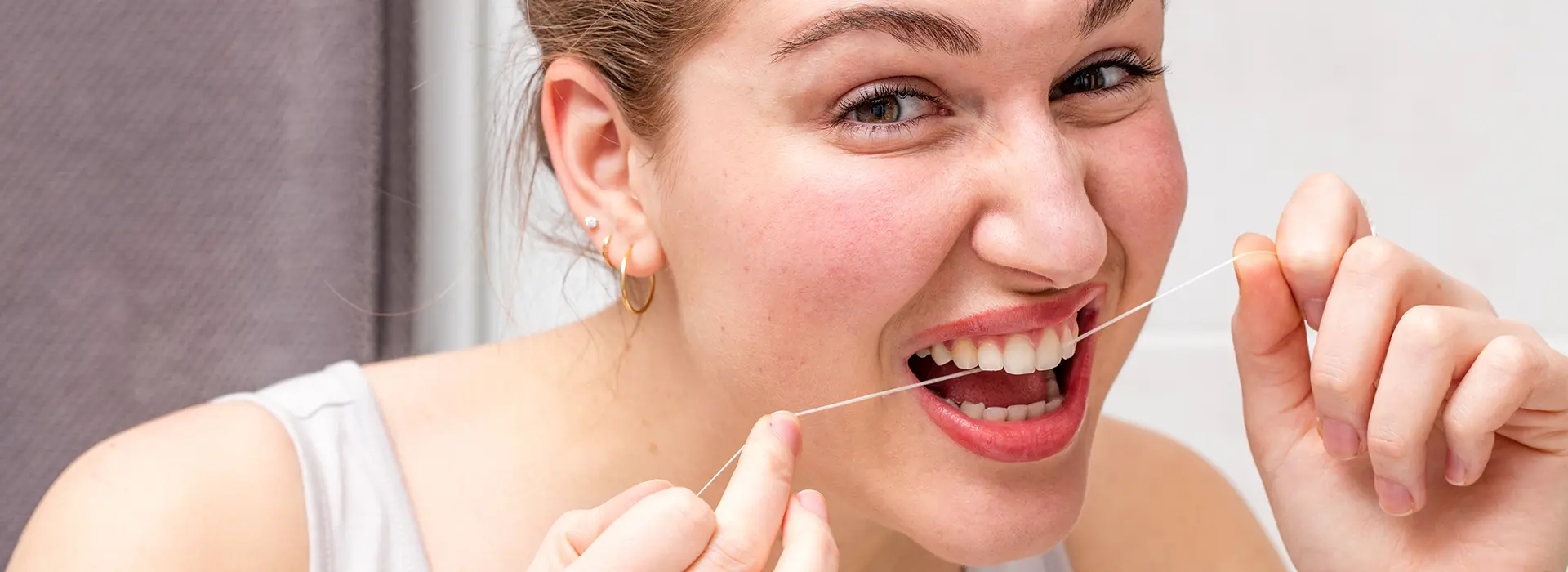Reviewed by Dr. Alan Baughman, DMD, MBA
Reading time: five minutes
Ever flossed and noticed a foul smell? You’re not alone. Many patients ask: Why does it smell bad when I floss?
The truth is, that smell usually means bacteria, plaque, or food debris has been trapped between your teeth. Left alone, it can lead to bad breath, tooth decay, or even gum disease.
In this blog, you will learn why you might notice a bad smell when you floss, why flossing is important and how to floss properly.
Table of Contents
- Why Flossing Is Important For Fresh Breath
- How To Floss The Right Way
- The Role Of Professional Dental Cleanings
- Book A Professional Dental Cleaning In Greeley, CO
- FAQs About Flossing
At Clearwater Dentistry in Greeley, CO, we offer professional dental cleanings for both kids and adults to remove plaque, tartar, and odor-causing buildup that regular brushing and flossing alone may miss.
Key Takeaway
If it smells bad when you floss, it’s usually due to trapped food particles, plaque buildup, and odor-causing bacteria between your teeth. This bad smell is a warning sign of poor oral hygiene or potential issues like gum disease or tooth decay.
Why Flossing Is Important For Fresh Breath
Brushing only reaches about 60% of your tooth surfaces. The rest? That’s where dental floss comes in.
Here’s why flossing matters:
- Removes rotting food particles: These leftover food particles smell worse the longer they sit in tight spaces.
- Clears out bacteria buildup: Oral bacteria trapped between your teeth release sulfur compounds and foul odor-producing gases.
- Prevents gum inflammation: Plaque hardens into tartar, which causes gum disease and bad odor.
- Protects against decay: Cavities often form between teeth where brushing can’t reach.
- Keeps your mouth feeling fresh: A consistent oral hygiene routine helps maintain fresh breath and a healthy oral cavity.
How To Floss The Right Way
If you already have a solid flossing routine, keep up the good work! But equally important is your flossing technique. If you’re flossing but not doing it correctly, you may not be getting the full benefits!
Follow these steps for cleaner, healthier flossing:
- Start with 18 inches of floss: Wrap it around your fingers with enough slack to move.
- Slide it gently between each tooth: Don’t snap it down or force it into gum tissues.
- Curve around the tooth in a C-shape: Clean beneath the gumline to remove odor-causing compounds.
- Use a clean section for each space: This prevents spreading harmful bacteria and maintains good oral hygiene.
- Floss once a day: This habit supports fresher breath and strong dental health.
When Should Kids Start Flossing?
You should start flossing your child’s teeth once two teeth touch side by side.
Here’s a quick age guide:
- Ages 2–6: Parents should floss for their child using gentle floss or water flossers.
- Ages 6–8: Kids begin learning proper technique with supervision.
- Age 9 and up: Children should floss independently as part of their oral hygiene practices.
Teaching these habits early helps prevent oral health issues and supports a healthy smile for life.
The Role Of Professional Dental Cleanings
Even with a solid oral hygiene routine, you still need professional dental cleanings. Dental hygienists get into all the nooks and crannies that you can’t reach with a toothbrush and floss alone.
Why regular cleanings matter:
- Remove hardened plaque (tartar): Prevent plaque buildup that fosters bad breath-causing bacteria.
- Prevent gum disease: Cleanings catch signs of gum disease early.
- Eliminate deep-seated odor: We remove debris and bad breath culprits in hard-to-reach areas.
- Keep your breath fresh: Professional cleaning enhances breath control and supports overall dental health.
Book A Professional Dental Cleaning In Greeley, CO
If you notice a bad smell when you floss, it’s nothing to be overly concerned about. However, it could be an indication that 1. you aren’t brushing correctly 2. you are not flossing enough or the right way or 3. it’s been too long since your last professional cleaning.
If you can’t remember the last time you had a cleaning, then it’s probably time to book an appointment!
To book a dental cleaning at our dental office in Greeley, CO, call (970) 515-3550 or visit us at 3110 67th Ave Pl, Greeley, CO.
FAQs About Flossing
Yes, it is possible to floss too often, especially if you’re using the wrong technique. Flossing more than once a day or being too aggressive can irritate your gums, cause bleeding, and even lead to gum recession over time. Once a day is enough for most people to keep plaque and food particles in check. The key is being consistent and gentle. If you’re unsure whether you’re flossing correctly, your dentist or dental hygienist can help you fine-tune your technique.
It’s generally best to floss before you brush. Flossing first helps loosen and remove food particles and plaque from between your teeth, so when you brush afterward, the fluoride from your toothpaste can reach more areas and be more effective. That said, the most important thing is that you floss and brush thoroughly every day, regardless of the order
If your gums bleed when you floss, it’s often a sign of inflammation, usually caused by plaque buildup along the gumline. This is common if you’ve just started flossing regularly or haven’t flossed in a while. With consistent, gentle flossing, the bleeding should improve within a week or two as your gums get healthier.
If you don’t like string floss, try a water flosser, interdental brushes, or floss picks. Pick something that is easy to use and that you will feel motivated to use.
Use a non-alcoholic antibacterial mouthwash and scrape your tongue. For tips on keeping your breath fresh, check out our guide: Fresh Breath Made Easy: Top Mouthwashes for Fighting Bad


